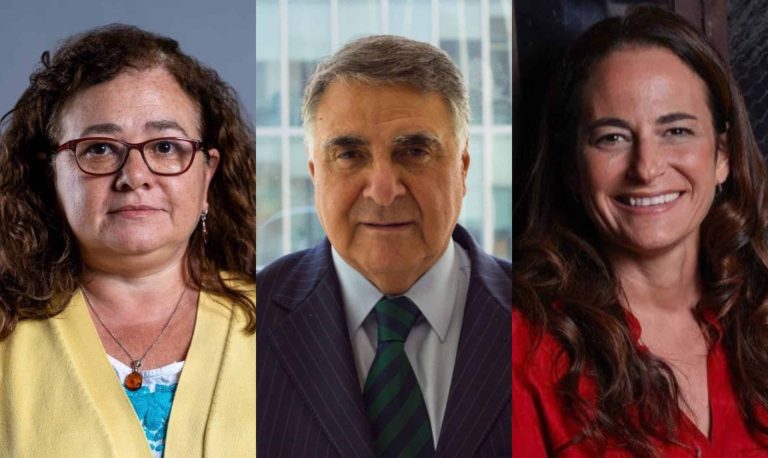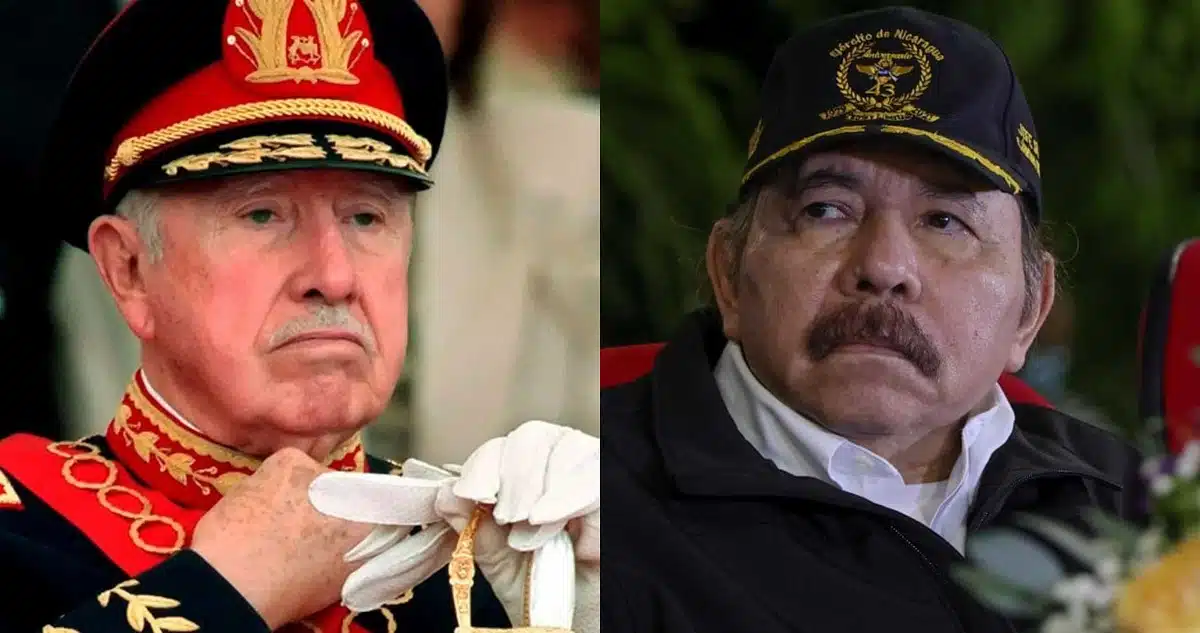28 de febrero 2023

Children of Exile: The Births “Sowing Hope” in the Camp of Nicaraguan Farmers

PUBLICIDAD 1M
PUBLICIDAD 4D
PUBLICIDAD 5D
CEJIL and HRW await the report of the UN Group of Experts and remind the regime that "impunity is not eternal"

CEJIL and HRW await the report of the UN Group of Experts and remind the regime that "impunity is not eternal"
The arbitrary stripping of 317 Nicaraguan citizens of their nationality, carried out by Daniel Ortega's regime between February 9 and 15, 2023, is unprecedented in Latin America. It is a much larger operation than the process carried out at the time by dictator Augusto Pinochet, who ruled Chile with an iron fist between 1973 and 1990.
The comparison was made by attorney Tamara Taraciuk, acting director of the Americas Division of Humans Rights Watch (HRW). On the television program Esta Semana this past Sunday, February 26, she said that in Chile, "there were nine cases, very few compared to the 317 in Nicaragua."
On February 9, 2023, the regime initiated a new stage of repression when it expelled and took away the nationality of 222 political prisoners. It then took away the nationality of Monsignor Rolando Alvarez, bishop of the Diocese of Matagalpa. Finally, on February 15, it penalized 94 more people, including writers, clergy, journalists, business people and social leaders, who were accused of being "traitors to the homeland".
The decision impacts their daily lives. "It's not just about having a passport and a nationality. What about their birth certificates, marriage certificates? All that architecture is going to take a bit of time to reassemble," Taraciuk lamented.
The human rights expert was talking about the new abuses by the regime that include the confiscation of assets and the taking away of pensions from "stateless" retirees carried out by the governmental Nicaraguan Social Security Institute.
Tarackiuk participated in a conversation on the television program Esta Semana, along with former Guatemalan prosecutor Claudia Paz y Paz and Chilean lawyer Edgardo Riveros, who concurred in highlighting the Ortega-Murillo dictatorship's violations of national and international norms.

Daniel Ortega's policies of stripping nationalities surpass those perpetrated by Augusto Pinochet. Photo: Confidencial | Montage: EFE.
Paz y Paz, a member of the International Group of Independent Experts for Nicaragua, is director of the Center for Justice and International Law. Riveros is an expert in international law, and a former Chilean congressman, who served as Under Secretary General of Government during the presidency of Patricio Aylwin, the first democratic administration after Pinochet's departure from power.
Riveros recalled that the most emblematic "denationalized" Chilean was Orlando Letelier, former foreign minister in the government of Salvador Allende. He was arbitrarily stripped of his nationality days before his assassination on September 21,1976 in Washington D.C., United States, in a terrorist attack perpetrated by agents of the Chilean secret police, DINA.
In the context of cases such as Nicaragua and Chile, Taraciuk affirmed that "justice takes time, but it does come," while Riveros warned those responsible for the repression in Nicaragua that they will not go unpunished. "Those who are in power today in Nicaragua must know that impunity is not eternal and they must be held accountable for the atrocities being committed," the jurist maintained.
Riveros acknowledged that "transitional justice" is always a complex issue, given the difficulty of rebuilding courts and justice systems capable of dealing with human rights violations committed during dictatorship.
According to Riveros' testimony, the change in the Chilean courts occurred gradually but, he explains, there are notable cases in Chile, such as that of the head of the Directorate of National Intelligence (DINA), General Manuel Contreras --indicted of serious abuses– who died in prison in 2015.
The statements by this group of three experts were released on the eve of the 52nd regular session of the UN Human Rights Council, being held February 27 to April 4, 2023.
Nicaragua will be on the agenda on March 6 when the report of the International Group of Independent Experts, which for a year has been investigating who is responsible for the crimes and human rights violations perpetrated in Nicaragua, will be presented.
"In terms of the United Nations system, the Human Rights Council has to act. We hope that the experts' report will forcefully make this point," said Riveros.
For Taraciuk, the key to addressing the serious situation in Nicaragua is to generate a regional response in which political and legal actions complement each other, despite ideological differences that may exist among the different Latin American governments.
"The political will of the other governments will be tested. It's possible a resolution will be presented in this session to renew the mandate of the [independent] experts [group for Nicaragua]. We hope it will be for two years," said the HRW official.
The legal specialist refers to the Group of Experts formed by the UN under Resolution 49/3 of March 31, 2022, in which they were mandated to undertake thorough and independent investigations into alleged abuses against citizens carried out by the regime since 2018.
The president of the UN Group of Experts is Jan-Michael Simon from Germany, joined by Ángela María Buitrago from Colombia and Alexandro Álvarez from Chile, according to information from the Group.
"We have to find a way for [the countries of the region] to be responsive to concerted pressure. It's important that there is consensus, including among governments of different ideologies, to talk about Nicaragua today," Taraciuk proposed.
The massive revocation of Nicaraguan nationality has mobilized the international community. The governments of Spain, Argentina, Ecuador, Chile, Colombia and Mexico have offered their nationalities to people politically persecuted by Ortega. It is an expression of solidarity. Paz y Paz encouraged Costa Rica to do the same for its neighbors.
In addition, on February 23, 17 member countries of the Organization of American States (OAS) celebrated the release of the 222 political prisoners and also condemned the stripping of their nationality. "We oppose the arbitrary cancellation of the nationality of 94 Nicaraguans on February 15, 2023, as well as the illegal seizure of their assets, and the use of these measures as a method of punishment and oppression," they emphasized.
Although the group of signatory countries that have accompanied the Nicaraguans demanding a return to democracy includes the United States, Costa Rica, Canada, Argentina, Guatemala, and Chile, among others, the silence of other nations is striking. For example, Mexico did not sign the statement, although President Andrés Manuel López Obrador offered nationality to those affected. Central American neighbors Panama, Honduras and El Salvador did not say anything either.
The three lawyers discussed how to prosecute these kinds of crimes in a country like Nicaragua where there is no rule of law.
The Guatemalan jurist Paz y Paz is the first to see an opportunity in the global reaction to the stripping of nationality. "Now that we have this international solidarity of countries offering to grant nationality, it is also a way to initiate processes to punish those responsible for these serious atrocities," she added.
Paz y Paz was one of the members of the International Group of Independent Experts (GIEI) that investigated the violent events that occurred in Nicaragua between April 18 and May 30, 2018. The group published a report in which they denounced the perpetration of crimes against humanity that could be prosecutable if other countries in the region opened their jurisdictions to conduct the respective investigations.
The possibility of involving the International Criminal Court was raised this week by the government of Colombia, headed by leftist Gustavo Petro, who rejected with "revulsion" the "denationalization" of Nicaraguan citizens.
"Colombia, which in recent decades has fought tirelessly to achieve peace (...) rejects the dictatorial actions of those who bring to mind the worst moments of the dictatorship of Anastasio Somoza that the Sandinistas managed to overcome," said the Colombian Foreign Ministry.
Taraciuk explained that the International Criminal Court has a mandate based on the Rome Statute, which has not been ratified by Nicaragua, and urged the international community to exert greater pressure against Ortega, who has shown that "he has no intention of giving in".
The Nicaraguan dictatorship suspended and has violated the civil rights of Nicaraguans since September 2018. There are still 35 political prisoners in Nicaragua. Opposition demonstrations have been prohibited by the Police, who have gone so far as to prevent religious processions.
The dictatorship's espionage agencies made targets of prominent clergy for their pastoral work, such as Monsignor Rolando Alvarez, bishop of Matagalpa. The Catholic priest is in a maximum security cell in the Tipitapa prison "La Modelo", after a court sentenced him to 26 years and four months in prison in retaliation for rejecting exile as an option.
For many years, another target of the dictatorship was Monsignor Silvio Baez, auxiliary bishop of Managua, exiled since 2019 due to threats from Sandinista fanatics. He was also stripped of his nationality on February 15, 2023 in the group of 94 citizens. Paz y Paz called this an extreme illegality, because the 94 were sanctioned without a sentence, becoming "the starkest proof of the regime's authoritarianism".
This article was originally published in Spanish in Confidencial and translated by our staff.
Archivado como:
PUBLICIDAD 3M
Periodista nicaragüense, exiliado. Comenzó su carrera en el año 2000, cuando todavía era estudiante. Por sus destacadas investigaciones periodísticas ha ganado el Premio Ortega y Gasset, el Premio Internacional de Periodismo Rey de España, el Premio a la Excelencia de la Sociedad Interamericana de Prensa, y el Premio Latinoamericano de Periodismo de Investigación del Instituto Prensa y Sociedad (IPYS).
PUBLICIDAD 3D